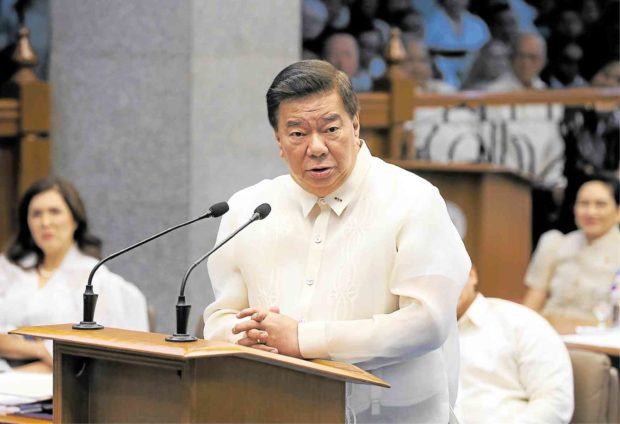Drilon reso urges Senate to assert role on treaty, deal withdrawal

Senator Franklin Drilon. FILE PHOTO
MANILA, Philippines—Senate Minority Leader Franklin Drilon wants the Senate to assert its role in treaty termination or withdrawal amid the government’s plan to terminate the Visiting Forces Agreement (VFA) with the United States.
On Wednesday, Drilon filed Senate Resolution No. 305, urging the chamber to “express its sense that termination of, or withdrawal from treaties and international agreements concurred in by the Senate shall be valid and effective only upon concurrence by the Senate.”
“The power to bind the Philippines by a treaty and international agreement is vested jointly by the Constitution in the President and the Senate,” he said in the resolution.
The senator pointed out the specific provision of the Constitution, which states that “no treaty of international agreement shall be valid and effective unless concurred in by at least two-thirds of all the members of the Senate.”
“A treaty or international agreement ratified by the President and concurred in by the Senate becomes part of the law of the land and may not be undone without the shared power that put it into effect,” Drilon said.
Article continues after this advertisementThe minority leader recalled initiating a similar resolution in 2017, which was supported by 13 senators.
Article continues after this advertisementIts passage was, however, blocked by then neophyte Senator Manny Pacquiao, said in a statement from Drilon’s office.
Drilon though noted that nine of the 13 co-authors of his 2017 resolution are still incumbent— Senate President Vicente Sotto III, Senate President Pro-Tempore Ralph Recto, Majority Leader Miguel Zubiri, Senators Leila De Lima, Francis Pangilinan, Risa Hontiveros, Panfilo Lacson, Sonny Angara, and Joel Villanueva.
While the resolution did not get the approval of Congress then, he said, succeeding resolutions adopted by the Senate explicitly provides for a provision, requiring the concurrence of two-thirds of all the members of the chamber before a treaty concurred in by the Senate is terminated.
“The principle of checks and balances, historical precedent and practice accepted as law in most jurisdictions, and the Constitution’s dictate for a shared treaty-making power require that a termination, withdrawal, abrogation or renunciation of a treaty or international agreement can only be done with the same authority that gave it effect – executive ratification with Senate concurrence,” Drilon further said in the resolution.
Drilon also stressed that “the sphere of foreign affairs is not within the exclusive powers of the President…” as he cited a previous Supreme Court’s case.